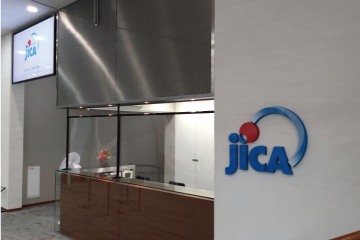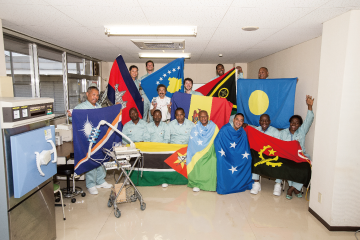- トップページ
- 日本国内での取り組み
- JICA関西
- 「人」明日へのストーリー
- A Message from a Former JICA scholar who have Studied Chagas Disease Control for El Salvador

Name: Ms. CANDRAY MEDINA Katherine Sofia
Course Name:
SATREPS The Project for Integrated Research and Development towards Chagas Disease Control, T.cruzi Genome Analysis
Course Period:from November 22, 2019 until June 30, 2023
On June 30, 2023, SATREPS long-term researcher Katherine returned to El Salvador after completing her doctoral course at the Osaka Metropolitan University, Graduate School of Medicine in Japan, here are her impressions of her research activities, daily life, and a message about her prospects.
Studied in Japan to control Chagas disease in El Salvador
Hello! My name is Katherine Candray and I want to share my experience during my doctoral studies in Japan in which I got the support of the JICA KCCP (Knowledge Co-creation Program) scholarship.
In El Salvador, my home country, I work as a medical doctor with a specialization in internal medicine, one of the most intriguing conditions I took care of was Chagas disease, As I gained insights into the pathophysiology, I became aware of the gap in knowledge that is still existing to these days, and I became interested in research.

Facade of Osaka Metropolitan University, Graduate School of Medicine. Osaka, Japan
In Japan, I had the opportunity to work with excellent professionals at Osaka Metropolitan University who are also very enthusiastic about expanding their research horizons. Biomedical research is very different from my previous studies. It is common to learn from the research projects of others to implement ideas in your own research. Scientific discussion in groups is open, neutral, and honest.

Entrance of the animal experimentation facility at Osaka Metropolitan University, Left:Katherine
In addition to acquiring technical knowledge, I have received training in research ethics. Likewise, I am learning the importance of communicating in a neutral, clear, brief, and efficient way and the importance of inter- and intra-institutional collaboration to get the most out of any project.
In all honesty, I want to mention that the fact of catching up with the academic level that is expected of me was a daily challenge. I have had to take a break and relearn my own identity as a professional, which is ultimately a rewarding process. Learning to
communicate fluently with researchers from other nationalities is something that goes beyond language and is also a process in which I gained a lot of patience, proactivity, and an open mind.

Performing serological tests of samples from El Salvador with a Point of Care lateral flow device. Osaka Metropolitan University, Japan.
During my stay in Japan and after my return to El Salvador, JICA has been extremely helpful and supportive. from seeking spaces to exchange cultures with other JICA scholars to offering open communication channels to resolve any problem or situation that arises in my academic or personal life, which is something very special about the agency.
After finishing my Ph.D. I am now in the process of starting new research within my country and collaborating with researchers from
abroad to strengthen not only my capabilities as an individual but also our research capacity as a country.

Light microscopy examination of cardiomyocytes infected with Trypanosoma cruzi. Parasitology department at Osaka Metropolitan University Graduate School of Medicine. Osaka, Japan.

Mid-term presentation of my research findings at JICA El Salvador. San Salvador. El Salvador.

Presentation of research findings at the end of my doctoral studies at the closure event of the SATREPS-CHAGAS project. San Salvador, El Salvador.













scroll